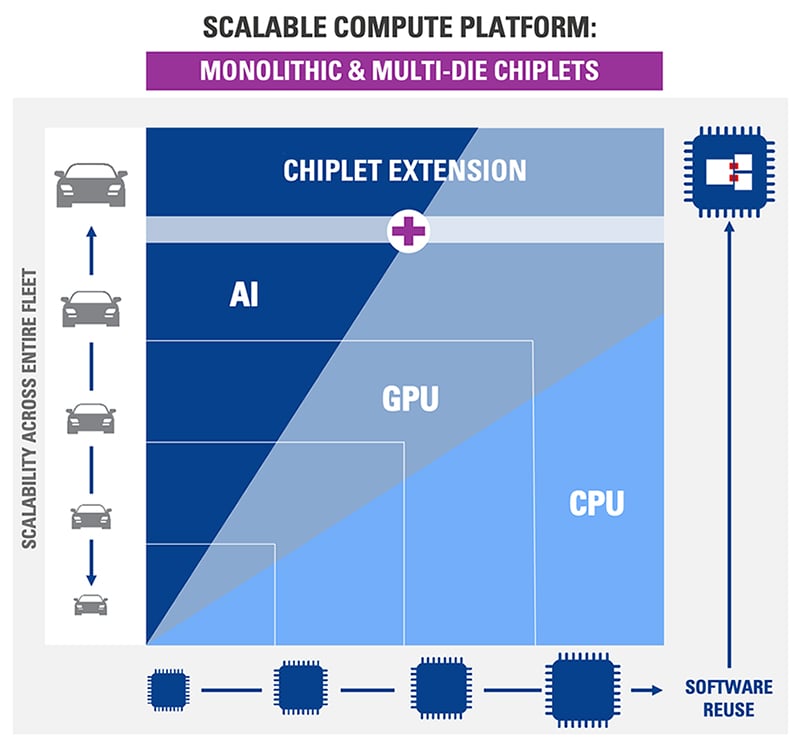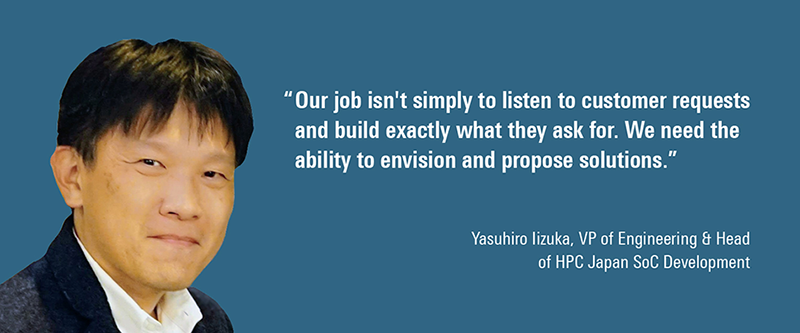Artificial intelligence, electrification, and advanced in-vehicle safety features are heavily influencing semiconductor system-on-chip (SoC) design, opening new opportunities for Renesas to expand our processing, sensing, power, software, and design support toolbox.
Recent events highlight the dynamic nature of the automotive SoC market, which by some estimates now exceeds $50 billion. In November, Renesas launched the first-of-its-kind R-Car X5H fusion SoC, which includes CPUs, AI-enabled NPU, and IVI-enabled GPU processing engines and the ability to further boost AI throughput with chiplet extensions. At the Consumer Electronics Show in January 2025, Honda and Renesas announced an agreement with Renesas to develop an SoC with industry-leading AI performance and power efficiency for future models of the Honda 0 Series EV platform.
These examples highlight the importance of SoCs in defining next-generation software-defined vehicles and indicate the transformation of semiconductor companies from discrete component suppliers to trusted solution partners working integrally with car OEMs and Tier 1 suppliers.
We recently spoke with Yasuhiro Iizuka, Renesas' new VP of Engineering & Head of High-Performance Computing (HPC) Japan SoC Development. Drawn to Renesas' rich automotive heritage, Yasuhiro joined the company late last year from Sony with a goal to accelerate growth by sharpening Renesas' automotive SoC focus.

Renesas: Welcome. What did you do at Sony, and what motivated you to join Renesas?
Yasuhiro: Prior to assuming my new role in late 2024, I spent 22 years at Sony, where I led the development of advanced SoCs and specialized chips for AI processing. These SoCs power platforms for high-end mirrorless cameras, like those used by professional photographers at the Olympics, and commercial cameras used in film and television production.
Why did I join Renesas? There are two reasons: In Japan, Renesas is the only company developing advanced SoCs with its own brand for automotive, and I believe my experience will benefit my colleagues and customers.
Second, Renesas has changed significantly over the past decade, transforming from a company selling devices to one designing solutions, including software. More than half of our employees come from outside Japan. We are truly a global company, and I am deeply invested in becoming part of this new chapter in Renesas' history.
Renesas: What are your goals at Renesas?
Yasuhiro: My ultimate goal is for Renesas SoCs to help eliminate all traffic accidents around the world. Before we achieve that grand vision, we must strengthen our current development capabilities.
That's why my immediate goal is singular: make our design center the best in the world within two years. In doing so, we will further elevate our world-class project management, development processes and design technologies, attract top talent, and ensure our culture rewards a team-based approach over individual achievement.

As we foster infrastructure and systems that are unified globally, a crucial element of that evolution is the Renesas "Shift Left" approach. Shift Left entails creating strategies to resolve issues during the planning phase as well as identifying potential risks. In doing so, we will be better at foreseeing challenges and implementing mitigation measures proactively.
Of course, risks don't just appear during planning; they emerge throughout the project lifecycle. At Sony, I emphasized a cultural mindset that I am carrying over to Renesas, where team members feel supported when they report problems, where everyone helps each other, and where there's a proactive desire to detect and remedy issues early.
Renesas: What does the future hold as automotive SoC design and AI continue to intersect?
Yasuhiro: Renesas' expertise in automotive areas like functional safety and reliability, combined with the ability to adopt industry-leading methodologies, gives us a significant competitive advantage. It's something I've been thinking about for the last 20 years: SoCs ultimately define the limits of a product. SoCs set the boundaries for software. The fact that so many large IT companies are developing their own SoCs is proof of this.
Touching on my background in digital imaging, camera technology has evolved from VGA to 8K, yielding a 100-fold increase in resolution. Thanks to AI, cameras can track the eyes of fast-moving objects like people and animals while maintaining focus. Today, even professional photographers rely on AI.
I see similar parallels with automotive SoCs in terms of breaking human limitations. Vehicles enhanced by AI SoCs, for example, are better able to avoid collisions by exceeding physical human reaction times. We will likely see a hierarchical structure, with real-time AI behaving as a kind of reflex for things like autonomous driving, and a cerebral cortex-like AI that understands people's plans, actions, and preferences to give instructions to the car.
Just as devices that can't connect to the network have started to look outdated, devices that can't be operated by generative AI will likely appear antiquated. While automobiles were slower to connect to networks compared to other devices, the initiative to make them operable by generative AI is progressing relatively well.
Renesas: As you settle into your new role, how do you take customer needs into consideration?
Yasuhiro: In defining the specifications for our SoCs, we need to consider the future of the automobile, the final product. We must envision the user experience that the car will provide and depict how that car should be built, not just in terms of device composition, but also software and networking. Our job isn't simply to listen to customer requests and build exactly what they ask for. We need the ability to envision and propose solutions.
Since we don't build cars ourselves, we can't paint this picture of the future solely using our own imagination. Discussions with OEMs and Tier 1 suppliers are essential. We need to consider the direction the automotive industry is heading, identify the challenges along the way, and determine what solutions Renesas should proactively develop.
Renesas: What is your impression of Renesas? What would you like your colleagues to know?
Yasuhiro: At Renesas, I'm surrounded by people who come from global leaders like Qualcomm, Intel, AMD, NXP, and TI. I interact with them daily across the U.S., Japan, India, and Vietnam. They are truly exceptional.
In leading the SoC development team, I will ensure that we continue to grow as strategic partners, shaping the future of automotive design, and that we are working together to be an indispensable part of that future.



